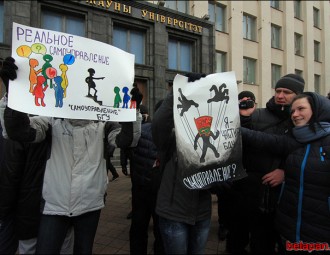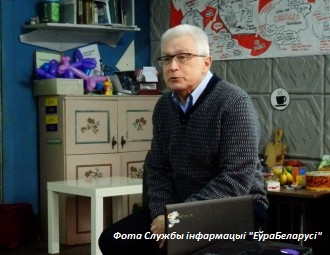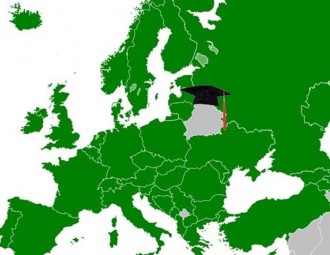- Details
- BIBC in Media
Concerns around lack of oversight and progress surround $109m loan
The World Bank has acknowledged that a loan of $109 million (€93m) it is providing to Belarus for higher education projects is only a step on the road to reforms agreed to by the country’s government, for which academics in Belarus say there is a lack of genuine commitment and oversight.
- Details
- BIBC in Media
On March 11, the U.S. Department of State published its assessment of the human rights situation in Belarus for 2019. The report touches upon respect of integrity, political prisoners, unlawful interference of authorities into the private life of citizens, etc. The document emphasizes violations of rights of independent media, including Belsat TV.
- Details
- BIBC in Media
Summary
The recognition that the Belarusian educational system is unbalanced and that the quality of the human capital leaves much to be desired, is not new. Only recently, however, the authorities have started to discuss this openly, following independent experts. Last year showed that all attempts to optimize this sector and to increase the efficiency of educational expenditures just confirm the inability of the authorities to develop and carry out a balanced educational policy. The helplessness of the State in educational policy means a serious challenge for the existing authoritative model of management of the sector.
Trends:
- Increased tension in education concerning the relations between various state institutions and interest groups, including the Ministry of Education, the Ministry of Labour and Social Protection, the managements of universities;
- Conservative interventions in education from a presidential chain of command;
- Aggravation of the systematic disproportions in education that do not lead to a real democratization of the management.
Key disproportions
In Belarusian education the most remarkable feature of 2013 is a well coordinated criticism of the inner system imbalances. Independent experts and analysts have spoken about the crisis of the national educational system before that; the news is a large-scale involvement of the heads of various branches of government. Until now the myth about the originality and completeness of the national educational system allowed to speak only about some ‘final polishing’ of the details. Nowadays even one of the main creators of this myth – Anatoly Rubinov – applies the measures of developed countries to Belarusian education. According to him, in the republic there are nearly three specialists with the higher education per worker. “It is obviously an abnormal proportion. It doesn’t correspond to international experience. In the developed countries this ratio depends on labor productivity: the higher the productivity is, the more specialists with higher education there are in relation to workers.”
Reproaches to the educational system, e.g. in connection with the excessive number of trained lawyers and economists could be heard earlier as well, at the same time it wasn’t proposed to follow the example of the West. On the contrary, in 2008 Rubinov formulated the fundamental principle of the Belarusian national myth: “One man’s meat is a Belarusian man’s poison”. And now at last it became clear that the ‘original’ educational policy is unable to rescue the national educational system.
In February 2013 the World Bank submitted the report Belarus Public Expenditure Review in which the main disproportions of the Belarusian educational system were formulated:
- for all the amazing progress in coverage of the population by all education levels, the quality and relevance of education services remain low;
- though expenses for education are comparable to similar indicators in other countries of the region, their efficiency is low;
- the existing system of financing creates weak incentives for a rational distribution of resources in the educational system.
Such a key indicator of cost efficiency as the number of pupils per teacher in the systems of both primary and secondary education is one of the lowest in the region. Moreover, despite the reduction of the number of pupils, the number of teachers continues to grow rather than to fall. In the World Bank report attention is paid to a remaining social inequality in access to education of good quality among needy groups of the population and inhabitants of rural areas.
If to judge according to the formal indicators of literacy, Belarus should have an exclusively high quality of human capital. In Belarus the coverage of general secondary education increased from 86.3% in 2000 to 107.4% in 2011 (excess of 100% due to those who get re-education). The coverage by the higher education reached 85.0%, which makes 467 students per 10,000 inhabitants and is one of the highest rates in the world. However, according to World Bank data, the country shows an unprecedented gap of supply and demand of professional competences. If to compare to the Central European region, Belarusian companies suffer most from the absence of workers with an adequate set of competences even when they have a significant number of specialists with official diplomas of a high level.
Last year statements on imbalances in education were found in speeches of state functionaries. The Deputy Prime Minister Anatoly Tozik complained about the inability to satisfy the needs of the population for preschool institutions. Agreeing with the conclusions of the World Bank experts, he was distressed that twenty years ago in Belarus there were 123 thousand teachers per 1.5 million pupils, and today there are 132 thousand teachers per 900 thousand pupils. Besides according to the Deputy Prime Minister, this situation is only aggravated by disproportions in training of pedagogical staff. He complained: “In 1990 there were 1 million 508 thousand pupils. And 4.7 thousand teachers were trained. Today there are 910 thousand pupils, and 10 thousand teachers are trained. As a result we face a vicious circle. Ideally, under today’s number of pupils we should train 3–3.5 thousand specialists for schools, and today we have 4.5 thousand state-financed students and moreover nearly 5.5 thousand are trained at their own expense.”
Secondary education: sharp decrease in quality
According to the Minister of Education Sergey Maskevich, “the network of the general secondary education which has developed in Belarus is inefficient from the economic point of view”. However the results of the authorities’ efforts, undertaken in 2013 to correct shortcomings, were discouragingly insignificant. In the course of optimization of higher schooling in 2013, according to the branch labor union, only 249 teachers were dismissed, while the number of pupils also reduced. The requirements for maximum number per class are note met. Closing small schools and classes, local authorities at the same time open others. The attempts to improve the salary of educators were not a success either. The increase of tariff rates with a simultaneous increase in workload from 18 to 20 hours per week led to the growth of salaries by 3% only. In the educational system not a single task of optimization of expenses and increase of the income of teachers was fulfilled.
The reasons for pessimism were intensified by the failed enrollment campaign. Instead of the planned 80 thousand first-year students, institutes of higher education could enroll only 68.7 thousand people. For the first time the shortage concerned a considerable number of the budgetary places for specialties of military, pedagogical and agricultural profiles. Discrimination enrollment restrictions for private institutes of higher education could not rescue the situation. Though it was obvious that the disproportion between the number of school graduates and the number of places at the first year increased, the authorities didn’t take any measures to improve the situation. In 2013 they continued to plan an 80-thousand enrollment in institutes of higher education whereas the number of school graduates didn’t even reach 60 thousand people (see the table 1).
| 2005/06 | 2009/10 | 2010/11 | 2011/12 | 2012/13 | 2013/14 | |
|---|---|---|---|---|---|---|
| Received secondary education (thousand of people) |
100.1 | 105.4 | 92.6 | 79.9 | 68.9 | 59.0 |
| Enrolled students (thousand of people) |
90.5 | 97.8 | 100.5 | 96.0 | 88.1 | 68.7 |
Table 1. The number of school graduates and students enrolled to institutes of higher education.
The incomplete enrollment in higher education institutions revealed another problem – a disastrous condition of secondary education. The data of 2013 enrollment campaign became especially evident for the public. The Republican Institute for Control of Knowledge of the Ministry of Education shocked the public with its statement that 32.7% of participants of the centralized testing (CT) on mathematics received 15 points and below, and 37.0% showed a similar result at physics. There was nothing new in such results, but for the first time the society understood that a third of entrants could not cope with a basic task and, thus, could not be enrolled as students. The underestimated lowest passing score – 15 out of 100 – appeared extremely sensitive for completing of the institutes of higher learning.But even more scandalous was the fact that the results of CT did not correlate with the marks in school registers. Monitoring of pupils’ educational quality, carried out by the National Institute of Education, made it clear that the problem-free secondary school is a consciously cultivated mirage that camouflages the decline in the quality of secondary education.
Management crisis and the attempts to stop it
Officials of all levels, being perplexed concerning disproportions and failures, prefer to get rid of responsibility for the imbalance of the educational system. 2013 is marked by searches of euphemisms that would allow throwing the onus onto certain anonymous forces or natural processes. The reference to demographic problems is especially popular. Though both depopulation and the growth of birth rate are perceived as an irresistible force that threatens the Belarusian school. But no matter what tricks the ministers and parliamentarians resort to, it is obvious that recognition of the inability to develop and carry out a balanced educational policy means a serious challenge to the existing authoritative model of management of this branch. First of all it means the veiled doubt in the ability of the President and Presidential administration to play a successful role of the only developers of educational strategy.
Article 107 of the Educational Code assigns an exclusive right to the President to define a state policy in education and to guarantee the realization of its main directions.
As the state educational policy is to balance the main variable systems – availability of education, its quality and expenses, – the existence of the disproportions which are constantly aggravating in this sphere shows not only a failure of the policy, but also the unfitness of the existing principles of educational management in Belarus. It leads to the fact that Alexander Lukashenko’s fears about the transformation of education into a political scene start becoming true. In the educational sphere the inquiry for participation of different interest groups during the taking of strategic decisions can be persistently heard. However now it comes mainly from the authorities. Therefore these claims cannot democratize a control system of education.
The management crisis is aggravated also by the fact that some actors who managed to get on a political scene can block rather than realize the undertaking of each other. For example, new Enrollment Regulations that reduce the level of social protection of the rural youth (refusal of separate competition) and orphan children in order to improve the quality of entrants has not been approved in the Presidential Administration for some years already. At the same time, a Presidential requirement to reduce the training process in higher education up to two years under the pretext of increasing work practice, which is detrimental for the schooling process, is successfully blocked at the level of the Ministry of Education.
It would be a big mistake not to notice invasions of foreign interest groups on the national political scene. The Belarusian market of educational services is actively dominated by providers from neighboring countries. Their lobby groups actively join the game.
The democratization of higher education is blocked not only by the position of the authorities, but also by the absence of the articulated request for participation in management of higher education from other stakeholders – employers, students, parents, the teaching community. In 2013 there appeared grounds to speak about the window of opportunity opening the prospect of some democratization of the legislative base of higher education.
Two events are able to create the conditions for expansion of public participation in education management: the second attempt of the Ministry of Education of Belarus to enter the European Higher Education Area (EHEA) in 2015 and the task connected with it to reform the Educational Code and the adjacent legislation which in their present form block the European vector of the development of Belarusian higher education. The unwillingness of the Belarusian authorities to recognize that the failure to enter EHEA in 2012 was connected with the conflict of European and Belarusian academic values has been replaced by a careful recognition of the fact that this conflict probably exists and demands some solution.
During 2013 the joint efforts of the European Commission, the Council of Europe, the European Union of Students and the Independent Bologna Committee succeeded in creating a more realistic view of the problems of the internationalization of Belarusian higher education among some of the heads of education. Since the Bologna seminar on May 16, 2013 where, thanks to the European commission, it was possible to begin some sort of a dialogue between civil society and the representatives of the Ministry of Education, the subject of a university autonomy, the decentralization of management and public participation in management of the higher education has been more and more discussed at the official level. The parliamentary hearings that were held on December 4, 2013 concerning the Educational Code showed that the reforming of legislation finds supporters in this direction among some head of state universities and officials. Besides, suggestion of the Ministry of Labour to reform the national system of qualifications creates prerequisites for a more active inclusion of associations of employers in quality management of higher education.
However the discussed changes fail to go beyond the redistribution of powers among the groups of a ruling class. Management decentralization is treated only as a transfer of the right to decision-making to the level of regional executive committees and district executive committees, and also to the level of heads of educational institutions.
The events at Hrodna State University showed how the strengthening of influence of regional power threatens the traditional academic values. Such decentralization leads to the abuse of power by local heads and increase the violation of rights of academic staff. But even when it concerns the expansion of autonomy of educational institutions, this independence does not go beyond some expansion of the rights of their heads in financial, staff and academic spheres. It should be recognized that no attempts of expansion of an organizational autonomy of educational institutions are planned in the short term.
However, the organizational autonomy is the main problem and obstacle of Belarus in its way to EHEA. As long as the rectors of higher educational institutions are ‘small cogs’ of the authoritarian machine rather than the representatives of the academic community no harmonization with European university values will ever happen.
Especially the discussion about the autonomy of educational institutions does not lead to a decrease in mass academic repressions initiated by representatives of a presidential chain of command at some Belarusian universities. Hrodna State University became the leader among the institutes that violate the rights of teaching staff in 2013 where according to the instructions of the governor not only a number of teachers, but also the rector Evgeny Rovba were dismissed, the reason for the latter was the fact that he hesitated with implementation of the order on dismissals. The particular feature of dismissals in Hrodna is the lack of an obvious political involvement of the victims. Teachers suffered for the contents of their publications, rather than for political activism. During 2013 the press reported about prosecution of professors in other higher educational institutes: at the Belarusian National Technical University , Brest State University , the Belarusian-Russian University (the case of a professor with a 50-year teaching history).
Last year the rights of pupils and students were widely and systematically violated. In Belarus annually about 80 thousand graduates of technical training college and institutes of higher education become victims of compulsory job placement, tens of thousands are involved in agricultural and construction work during class hours. Besides forced labor, the restriction of the rights to freedom of movement, associations, to participation in management of educational institutions, etc. is widely practiced.
Conclusion
Last year showed that as soon as the myth about the national identity of the Belarusian education with its illusory and false aims failed, the actions of the authorities became more rapid. In many respects it was caused by timid attempts to optimize expenditures and to increase economic efficiency of the educational system. The state cannot fulfill its social obligations any more. Therefore education has to survive at the expense of its own internal resources.
Officials call upon private capital to be admitted in the educational sector, rest their hopes for inflow of foreign students or for dismissal of the teaching staff. They are even ready to decentralize the educational management, which challenges an exclusive role of the presidential administration. But the authorities are not ready for any real democratization and abandoning authoritarian management principles. However now it can effectively use the traditional mechanisms of management. Even recognizing the existence of disproportions and imbalance of the educational system, the authorities are not capable of decisive actions, limiting themselves to shy palliatives and modest experiments which do not change an overall picture of stagnation in the sector.
—————————–
- 1. Ministry of Education of the Republic of Belarus. Press release based on the materials of press conference dedicated to the results of the 2013 enrollment campaign into the institutions of higher learning, 30.08.2013
- 2. Rubinov А. Pedagogical itch of reformativeness
- 3. The World Bank. Review of the state expenses in the Republic of Belarus. Part II. 2013. 21 February, pp. 68–70.
- 4. The World Bank, op. cit, p. 72.
- 5. http://edu.gov.by/main.aspx?guid=18021&detail=1315583
- 6. Overloaded children, teachers’ salary, lack of hours: what is the weak point of the modern school? Sovetskaya Belorussiya. 2013. 23 May
- 7. Press release of the Ministry of Education of Belarus
- 8. http://news.tut.by/society/355336.html
- 9. http://www.ej.by/news/sociaty/2013/06/30/rossiyskie_vuzy_zahvatyvayut_belorusskiy_rynok.html
- 10. http://edu.gov.by/main.aspx?guid=18021&detail=1305083
- 11. http://edu.gov.by/main.aspx?guid=18021&detail=1315583
- 12. http://charter97.org/ru/news/2013/4/2/67422
- 13.http://www.ej.by/news/sociaty/2013/11/21/delovoe_soobschestvo_vstupilos_za_treh_professorov_bntu.html
- 14. http://charter97.org/ru/news/2013/10/3/76843
Vladimir Dounaev
2013

- Details
- BIBC in Media
EuroBelarus: It is necessary for the public to raise its voice to mobilize the educational reforms in Belarus.

- Details
- BIBC in Media
EuroBelarus: During the Student Week Uladzimir Dunaeu, the member of the public Bologna committee, gave a public lecture and spoke about the long road of Belarus towards the Bologna Process.

Uladzimir Dunaeu: Refusal from education reform is a blow for country’s repute & Belarusians’ future
- Details
- BIBC in Media
EuroBelarus: The state again offers its electorate cheap but low-quality education; however, the time of undemanding employers is the thing of the past, claims Professor Uladzimir Dunaeu.

- Details
- BIBC in Media
EuroBelarus: No one still wants to reform the system of higher education in Belarus; moreover, the authorities even embarrassed themselves at a meeting of the monitoring group on the subject.
- Details
- BIBC in Media
Belarusan students, mainly those studying at the BSU faculties, held a demonstration called a “March of love and solidarity” on December 2. There are no results of the demonstration as such – basically, the university’s administration didn’t react to the students’ initiative in a proper way. On the other hand, the organization of the demonstration can be indirectly connected with the Bologna process, which Belarus has recently joined.



